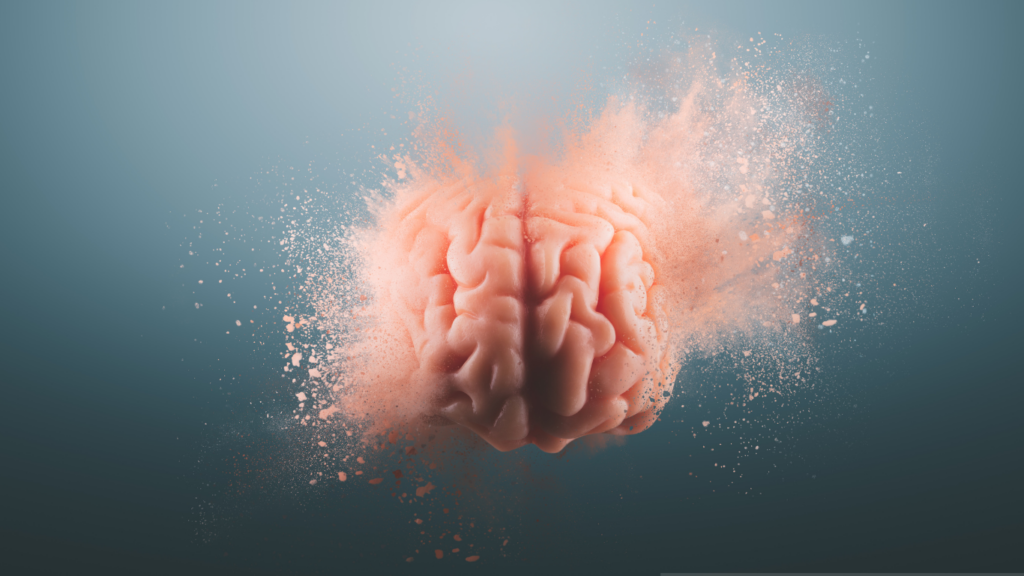Natural Solutions to Combat Brain Fog

Brain fog, often described as mental fatigue, is not a medical condition itself but a symptom of various underlying issues. It manifests as cognitive impairments including difficulty concentrating, forgetfulness, and a lack of mental clarity and sharpness. Individuals experiencing brain fog often report feeling “cloudy” or as if their thoughts are muddled and not as quick as usual.
The effects of brain fog extend beyond simple frustrations with memory or concentration. It can significantly impair an individual’s work performance, reducing productivity and the ability to focus on tasks. Social relationships can suffer as well, as individuals may find it challenging to engage in conversations or social activities. Overall, persistent brain fog can decrease the quality of life, leading to dissatisfaction and a reduced sense of well-being.
In this article, we will discuss natural ways to alleviate brain fog through diet, sleep improvement, stress management, physical activity, and targeted supplements.
Factors Associated with Brain Fog
- Stress and Anxiety:
Chronic stress negatively affects brain function through sustained high cortisol levels, which interfere with synaptic plasticity; the ability of synapses to strengthen or weaken over time, which is crucial for learning and memory. Excessive cortisol can disrupt the balance and function of neurotransmitters, leading to reduced concentration and memory retention, hallmark symptoms of brain fog. (1, 2)
- Sleep Quality:
Good sleep facilitates critical brain functions, including neuroplasticity and memory consolidation. During sleep, the brain undergoes processes that clear out toxins and build neural connections. (3)
Lack of sleep disrupts these processes, leading to accumulated neurotoxic waste like beta-amyloid, which has been linked to impaired function and brain fog. Furthermore, poor sleep decreases the efficiency of the glymphatic system, responsible for clearing these wastes from the brain. (3, 4, 5)
- Dietary Habits:
Poor dietary choices can contribute to brain fog by inducing systemic inflammation and oxidative stress, which impair neuronal function and neuroplasticity. Diets high in processed foods, sugar, and trans fats elevate inflammatory markers such as C-reactive protein and interleukin-6, directly impacting cognitive health and leading to mental fatigue and reduced cognitive clarity. (6, 7, 8)
- Lack of Physical Activity:
Physical exercise increases blood flow to the brain, which is crucial for delivering oxygen and nutrients essential for neurogenesis and overall brain health. Regular physical activity also promotes the release of growth factors such as BDNF (Brain-Derived Neurotrophic Factor), which supports the formation of new neuronal connections and enhances cognitive functions. (9, 10)
- Hormonal Imbalances:
Hormones like thyroid hormones, estrogen, and insulin directly affect brain function. Imbalances, such as hypothyroidism or insulin resistance, can lead to metabolic disruptions that affect brain health, impacting cognitive abilities and contributing to the symptoms of brain fog. (11, 12, 13)
Natural Solutions to Reduce Brain Fog
Nutrition Tips:
- Antioxidant-rich foods combat oxidative stress in the brain. Antioxidants neutralize free radicals, protecting neurons from damage and supporting cognitive function. (14, 15)
- Omega-3 fatty acids are critical for maintaining cell membrane health and fluidity, facilitating better communication between neurons. The anti-inflammatory properties of omega-3s also reduce neuronal inflammation, which can improve cognitive function. (16)
- Fermented foods and probiotics support gut health, which is linked to brain health through the gut-brain axis. A healthy gut microbiota can influence the production of neurotransmitters like serotonin, which not only regulate mood but also cognitive functions. (17, 18, 19)
- Reducing sugar and processed foods helps stabilize blood sugar levels, preventing spikes and crashes that can exacerbate brain fog. (20, 21)

Sleep Hygiene:
- Implementing a consistent sleep schedule and practicing good sleep hygiene helps regulate the circadian rhythm, which optimizes brain function and recovery. (22)
- Supplements like melatonin can aid in regulating sleep-wake cycles, while magnesium plays a role in deactivating adrenaline, facilitating relaxation and sleep. (23, 24)
Stress Management:
- Techniques such as meditation, yoga, and deep-breathing exercises reduce stress by lowering cortisol levels and enhancing blood flow to the brain, which improves cognitive clarity. (25, 26)
- Adaptogenic herbs like ashwagandha and rhodiola rosea modulate the stress response system, helping to clear brain fog by stabilizing the body’s neuroendocrine response. (27, 28)
Physical Activity:
- Cardiovascular and resistance exercises stimulate brain health by improving cerebral blood flow and increasing neuronal survival signals, which protect against cognitive decline associated with brain fog. (29)
Mental Exercises:
- Cognitive activities like puzzles, reading, and learning new skills stimulate neurogenesis and strengthen neural networks, which are essential for cognitive clarity. (30)
- Mindfulness and concentration practices enhance mental focus and reduce scattered thinking, common in brain fog scenarios. (31)
Supportive Supplements and Herbal Remedies
Vitamins and Minerals:
- Vitamin B12 is crucial for maintaining the health of neurons and the production of red blood cells, which are essential for delivering oxygen to the brain. Deficiencies can lead to cognitive dysfunction manifesting as brain fog. (32, 33)
- Vitamin D receptors are found throughout the brain, suggesting its role in cognitive processes and the regulation of neurotransmitters. (34, 35, 36)
- Magnesium acts as a gatekeeper for NMDA receptors, which are involved in synaptic plasticity and memory function. Adequate magnesium levels prevent neurons from overstimulation, protecting against potential damage and maintaining cognitive functions. (37, 38)
- Zinc influences neurotransmitter release and is essential for the function and signaling of neurons. Low zinc levels can lead to altered cognition and increased risk of neurological issues. (39, 40)
Herbal Supplements:
- Ginkgo Biloba increases cerebral blood flow, enhancing oxygen and nutrient delivery to the brain, which is vital for cognitive function. Its antioxidant properties also protect neurons from oxidative stress, reducing the risk of cognitive decline associated with brain fog. (41)
- Bacopa Monnieri boosts brain function by enhancing dendritic proliferation, which enhances neural communication. This herb also aids in combating oxidative stress within the brain, supporting memory and cognition. (42, 43)
- Green Tea contains L-Theanine, which increases the activity of the inhibitory neurotransmitter GABA, reducing anxiety and stress. The modest amount of caffeine present provides a non-jittery boost to brain function, improving alertness and attention. (44, 45)
Essential Oils:
- Lavender Oil has anxiolytic properties due to its ability to inhibit voltage-dependent calcium channels in neurons, similar to the mechanism of certain anti-anxiety medications. This can help alleviate the anxiety component of brain fog. (46)
- Rosemary Oil contains 1,8-cineole, which can enhance memory by increasing acetylcholine levels, a neurotransmitter crucial for cognitive processes. (47)
- Peppermint Oil is stimulating and can improve mental clarity and raise energy levels. The menthol in peppermint is known to have a refreshing effect on the mind, enhancing alertness. (48, 49)
Lifestyle Changes
Implementing lifestyle changes can significantly alleviate brain fog. Reducing screen time helps avoid cognitive overload and improves sleep by minimizing blue light exposure, which can disrupt circadian rhythms. Engaging in social activities enhances mental health by stimulating communication and emotional connection, vital for cognitive function. Pursuing hobbies encourages neuroplasticity through learning and sensory stimulation, keeping the mind active and clear. Together, these adjustments create a healthier mental environment, combatting the symptoms of brain fog effectively. (50,51, 52)
References:
- McEwen BS, Nasca C, Gray JD. Stress Effects on Neuronal Structure: Hippocampus, Amygdala, and Prefrontal Cortex. Neuropsychopharmacology. 2016 Jan;41(1):3-23. doi: 10.1038/npp.2015.171. Epub 2015 Jun 16. PMID: 26076834; PMCID: PMC4677120.
- Sic, A., Cvetkovic, K., Manchanda, E., & Knezevic, N. N. (2024). Neurobiological Implications of Chronic Stress and Metabolic Dysregulation in Inflammatory Bowel Diseases. Diseases, 12(9), 220. https://doi.org/10.3390/diseases12090220
- Eugene AR, Masiak J. The Neuroprotective Aspects of Sleep. MEDtube Sci. 2015 Mar;3(1):35-40. PMID: 26594659; PMCID: PMC4651462.
- Shokri-Kojori E, Wang GJ, Wiers CE, Demiral SB, Guo M, Kim SW, Lindgren E, Ramirez V, Zehra A, Freeman C, Miller G, Manza P, Srivastava T, De Santi S, Tomasi D, Benveniste H, Volkow ND. β-Amyloid accumulation in the human brain after one night of sleep deprivation. Proc Natl Acad Sci U S A. 2018 Apr 24;115(17):4483-4488. doi: 10.1073/pnas.1721694115. Epub 2018 Apr 9. PMID: 29632177; PMCID: PMC5924922.
- Buongiorno, M., Granell, E., Caruana, G. et al. Impairments in sleep and brain molecular clearance in people with cognitive deterioration and biological evidence of AD: a report of four cases. BMC Neurol 23, 417 (2023). https://doi.org/10.1186/s12883-023-03460-8
- Tan BL, Norhaizan ME. Effect of High-Fat Diets on Oxidative Stress, Cellular Inflammatory Response and Cognitive Function. Nutrients. 2019 Oct 25;11(11):2579. doi: 10.3390/nu11112579. PMID: 31731503; PMCID: PMC6893649.
- Beilharz JE, Maniam J, Morris MJ. Diet-Induced Cognitive Deficits: The Role of Fat and Sugar, Potential Mechanisms and Nutritional Interventions. Nutrients. 2015 Aug 12;7(8):6719-38. doi: 10.3390/nu7085307. PMID: 26274972; PMCID: PMC4555146.
- Kurowska, A., Ziemichód, W., Herbet, M., & Piątkowska-Chmiel, I. (2023). The Role of Diet as a Modulator of the Inflammatory Process in the Neurological Diseases. Nutrients, 15(6), 1436. https://doi.org/10.3390/nu15061436
- Sleiman SF, Henry J, Al-Haddad R, El Hayek L, Abou Haidar E, Stringer T, Ulja D, Karuppagounder SS, Holson EB, Ratan RR, Ninan I, Chao MV. Exercise promotes the expression of brain derived neurotrophic factor (BDNF) through the action of the ketone body β-hydroxybutyrate. Elife. 2016 Jun 2;5:e15092. doi: 10.7554/eLife.15092. PMID: 27253067; PMCID: PMC4915811.
- Sanaeifar, F., Pourranjbar, S., Pourranjbar, M., Ramezani, S., Mehr, S. R., Wadan, A. S., & Khazeifard, F. (2024). Beneficial effects of physical exercise on cognitive-behavioral impairments and brain-derived neurotrophic factor alteration in the limbic system induced by neurodegeneration. Experimental Gerontology, 195, 112539. https://doi.org/10.1016/j.exger.2024.112539
- Bernal J. Thyroid Hormones in Brain Development and Function. [Updated 2022 Jan 14]. In: Feingold KR, Anawalt B, Blackman MR, et al., editors. Endotext [Internet]. South Dartmouth (MA): MDText.com, Inc.; 2000-. Available from: https://www.ncbi.nlm.nih.gov/books/NBK285549/
- Yates KF, Sweat V, Yau PL, Turchiano MM, Convit A. Impact of metabolic syndrome on cognition and brain: a selected review of the literature. Arterioscler Thromb Vasc Biol. 2012 Sep;32(9):2060-7. doi: 10.1161/ATVBAHA.112.252759. PMID: 22895667; PMCID: PMC3442257.
- Heni M. The insulin resistant brain: impact on whole-body metabolism and body fat distribution. Diabetologia. 2024 Jul;67(7):1181-1191. doi: 10.1007/s00125-024-06104-9. Epub 2024 Feb 16. PMID: 38363340; PMCID: PMC11153284.
- Feng J, Zheng Y, Guo M, Ares I, Martínez M, Lopez-Torres B, Martínez-Larrañaga MR, Wang X, Anadón A, Martínez MA. Oxidative stress, the blood-brain barrier and neurodegenerative diseases: The critical beneficial role of dietary antioxidants. Acta Pharm Sin B. 2023 Oct;13(10):3988-4024. doi: 10.1016/j.apsb.2023.07.010. Epub 2023 Jul 16. PMID: 37799389; PMCID: PMC10547923.
- Lee KH, Cha M, Lee BH. Neuroprotective Effect of Antioxidants in the Brain. Int J Mol Sci. 2020 Sep 28;21(19):7152. doi: 10.3390/ijms21197152. PMID: 32998277; PMCID: PMC7582347.
- Dighriri IM, Alsubaie AM, Hakami FM, Hamithi DM, Alshekh MM, Khobrani FA, Dalak FE, Hakami AA, Alsueaadi EH, Alsaawi LS, Alshammari SF, Alqahtani AS, Alawi IA, Aljuaid AA, Tawhari MQ. Effects of Omega-3 Polyunsaturated Fatty Acids on Brain Functions: A Systematic Review. Cureus. 2022 Oct 9;14(10):e30091. doi: 10.7759/cureus.30091. PMID: 36381743; PMCID: PMC9641984.
- Appleton J. The Gut-Brain Axis: Influence of Microbiota on Mood and Mental Health. Integr Med (Encinitas). 2018 Aug;17(4):28-32. PMID: 31043907; PMCID: PMC6469458.
- Ansari F, Neshat M, Pourjafar H, Jafari SM, Samakkhah SA, Mirzakhani E. The role of probiotics and prebiotics in modulating of the gut-brain axis. Front Nutr. 2023 Jul 26;10:1173660. doi: 10.3389/fnut.2023.1173660. PMID: 37565035; PMCID: PMC10410452.
- Balasubramanian, R., Schneider, E., Gunnigle, E., Cotter, P. D., & Cryan, J. F. (2024). Fermented foods: Harnessing their potential to modulate the microbiota-gut-brain axis for mental health. Neuroscience & Biobehavioral Reviews, 158, 105562. https://doi.org/10.1016/j.neubiorev.2024.105562
- Gillespie KM, White MJ, Kemps E, Moore H, Dymond A, Bartlett SE. The Impact of Free and Added Sugars on Cognitive Function: A Systematic Review and Meta-Analysis. Nutrients. 2023 Dec 25;16(1):75. doi: 10.3390/nu16010075. PMID: 38201905; PMCID: PMC10780393.
- Witek K, Wydra K, Filip M. A High-Sugar Diet Consumption, Metabolism and Health Impacts with a Focus on the Development of Substance Use Disorder: A Narrative Review. Nutrients. 2022 Jul 18;14(14):2940. doi: 10.3390/nu14142940. PMID: 35889898; PMCID: PMC9323357.
- Desai D, Momin A, Hirpara P, Jha H, Thaker R, Patel J. Exploring the Role of Circadian Rhythms in Sleep and Recovery: A Review Article. Cureus. 2024 Jun 3;16(6):e61568. doi: 10.7759/cureus.61568. PMID: 38962617; PMCID: PMC11221196.
- Djokic G, Vojvodić P, Korcok D, Agic A, Rankovic A, Djordjevic V, Vojvodic A, Vlaskovic-Jovicevic T, Peric-Hajzler Z, Matovic D, Vojvodic J, Sijan G, Wollina U, Tirant M, Thuong NV, Fioranelli M, Lotti T. The Effects of Magnesium – Melatonin – Vit B Complex Supplementation in Treatment of Insomnia. Open Access Maced J Med Sci. 2019 Aug 30;7(18):3101-3105. doi: 10.3889/oamjms.2019.771. PMID: 31850132; PMCID: PMC6910806.
- Zisapel N. New perspectives on the role of melatonin in human sleep, circadian rhythms and their regulation. Br J Pharmacol. 2018 Aug;175(16):3190-3199. doi: 10.1111/bph.14116. Epub 2018 Jan 15. PMID: 29318587; PMCID: PMC6057895.
- Bentley TGK, D’Andrea-Penna G, Rakic M, Arce N, LaFaille M, Berman R, Cooley K, Sprimont P. Breathing Practices for Stress and Anxiety Reduction: Conceptual Framework of Implementation Guidelines Based on a Systematic Review of the Published Literature. Brain Sci. 2023 Nov 21;13(12):1612. doi: 10.3390/brainsci13121612. PMID: 38137060; PMCID: PMC10741869.
- Örün D, Karaca S, Arıkan Ş. The Effect of Breathing Exercise on Stress Hormones. Cyprus J Med Sci. 2021 Dec;6(1):22-27. doi:10.4274/cjms.2021.2020.2390.
- Panossian A, Wikman G. Effects of Adaptogens on the Central Nervous System and the Molecular Mechanisms Associated with Their Stress-Protective Activity. Pharmaceuticals (Basel). 2010 Jan 19;3(1):188-224. doi: 10.3390/ph3010188. PMID: 27713248; PMCID: PMC3991026.
- Concerto C, Infortuna C, Muscatello MRA, Bruno A, Zoccali R, Chusid E, Aguglia E, Battaglia F. Exploring the effect of adaptogenic Rhodiola Rosea extract on neuroplasticity in humans. Complement Ther Med. 2018 Dec;41:141-146. doi: 10.1016/j.ctim.2018.09.013. Epub 2018 Sep 22. PMID: 30477830.
- Bliss ES, Wong RH, Howe PR, Mills DE. Benefits of exercise training on cerebrovascular and cognitive function in ageing. J Cereb Blood Flow Metab. 2021 Mar;41(3):447-470. doi: 10.1177/0271678X20957807. Epub 2020 Sep 20. PMID: 32954902; PMCID: PMC7907999.
- Marzola P, Melzer T, Pavesi E, Gil-Mohapel J, Brocardo PS. Exploring the Role of Neuroplasticity in Development, Aging, and Neurodegeneration. Brain Sci. 2023 Nov 21;13(12):1610. doi: 10.3390/brainsci13121610. PMID: 38137058; PMCID: PMC10741468.
- Yue WL, Ng KK, Koh AJ, Perini F, Doshi K, Zhou JH, Lim J. Mindfulness-based therapy improves brain functional network reconfiguration efficiency. Transl Psychiatry. 2023 Nov 11;13(1):345. doi: 10.1038/s41398-023-02642-9. PMID: 37951943; PMCID: PMC10640625.
- Kennedy DO. B Vitamins and the Brain: Mechanisms, Dose and Efficacy–A Review. Nutrients. 2016 Jan 27;8(2):68. doi: 10.3390/nu8020068. PMID: 26828517; PMCID: PMC4772032.
- Tardy, L., Pouteau, E., Marquez, D., Yilmaz, C., & Scholey, A. (2020). Vitamins and Minerals for Energy, Fatigue and Cognition: A Narrative Review of the Biochemical and Clinical Evidence. Nutrients, 12(1), 228. https://doi.org/10.3390/nu12010228
- Anjum I, Jaffery SS, Fayyaz M, Samoo Z, Anjum S. The Role of Vitamin D in Brain Health: A Mini Literature Review. Cureus. 2018 Jul 10;10(7):e2960. doi: 10.7759/cureus.2960. PMID: 30214848; PMCID: PMC6132681.
- Gáll Z, Székely O. Role of Vitamin D in Cognitive Dysfunction: New Molecular Concepts and Discrepancies between Animal and Human Findings. Nutrients. 2021 Oct 20;13(11):3672. doi: 10.3390/nu13113672. PMID: 34835929; PMCID: PMC8620681.
- Sailike, B., Onzhanova, Z., Akbay, B., Tokay, T., & Molnár, F. (2024). Vitamin D in Central Nervous System: Implications for Neurological Disorders. International Journal of Molecular Sciences, 25(14), 7809. https://doi.org/10.3390/ijms25147809
- Hou H, Wang L, Fu T, Papasergi M, Yule DI, Xia H. Magnesium Acts as a Second Messenger in the Regulation of NMDA Receptor-Mediated CREB Signaling in Neurons. Mol Neurobiol. 2020 Jun;57(6):2539-2550. doi: 10.1007/s12035-020-01871-z. Epub 2020 Mar 25. PMID: 32215817; PMCID: PMC8202957.
- Maier JAM, Locatelli L, Fedele G, Cazzaniga A, Mazur A. Magnesium and the Brain: A Focus on Neuroinflammation and Neurodegeneration. Int J Mol Sci. 2022 Dec 23;24(1):223. doi: 10.3390/ijms24010223. PMID: 36613667; PMCID: PMC9820677.
- Li Z, Liu Y, Wei R, Yong VW, Xue M. The Important Role of Zinc in Neurological Diseases. Biomolecules. 2022 Dec 23;13(1):28. doi: 10.3390/biom13010028. PMID: 36671413; PMCID: PMC9855948.
- Sun, R., Wang, J., Feng, J., & Cao, B. (2022). Zinc in Cognitive Impairment and Aging. Biomolecules, 12(7), 1000. https://doi.org/10.3390/biom12071000
- Singh SK, Srivastav S, Castellani RJ, Plascencia-Villa G, Perry G. Neuroprotective and Antioxidant Effect of Ginkgo biloba Extract Against AD and Other Neurological Disorders. Neurotherapeutics. 2019 Jul;16(3):666-674. doi: 10.1007/s13311-019-00767-8. PMID: 31376068; PMCID: PMC6694352.
- Walker EA, Pellegrini MV. Bacopa monnieri. [Updated 2023 Mar 17]. In: StatPearls [Internet]. Treasure Island (FL): StatPearls Publishing; 2025 Jan-. Available from: https://www.ncbi.nlm.nih.gov/books/NBK589635/
- Aguiar S, Borowski T. Neuropharmacological review of the nootropic herb Bacopa monnieri. Rejuvenation Res. 2013 Aug;16(4):313-26. doi: 10.1089/rej.2013.1431. PMID: 23772955; PMCID: PMC3746283.
- Dietz C, Dekker M. Effect of Green Tea Phytochemicals on Mood and Cognition. Curr Pharm Des. 2017;23(19):2876-2905. doi: 10.2174/1381612823666170105151800. PMID: 28056735.
- Baba Y, Inagaki S, Nakagawa S, Kaneko T, Kobayashi M, Takihara T. Effects of l-Theanine on Cognitive Function in Middle-Aged and Older Subjects: A Randomized Placebo-Controlled Study. J Med Food. 2021 Apr;24(4):333-341. doi: 10.1089/jmf.2020.4803. Epub 2021 Mar 22. PMID: 33751906; PMCID: PMC8080935.
- Schuwald, Anita & Nöldner, Michael & Wilmes, Thomas & Klugbauer, Norbert & Friedland, Kristina & Müller, Walter. (2013). Lavender Oil-Potent Anxiolytic Properties via Modulating Voltage Dependent Calcium Channels. PloS one. 8. e59998. 10.1371/journal.pone.0059998.
- Moss M, Oliver L. Plasma 1,8-cineole correlates with cognitive performance following exposure to rosemary essential oil aroma. Ther Adv Psychopharmacol. 2012 Jun;2(3):103-13. doi: 10.1177/2045125312436573. PMID: 23983963; PMCID: PMC3736918.
- Lv X, Feng Y, Ma R, Tang Y, Li Y, Cui D, Wu Y. Effects of Peppermint Essential Oil on Learning and Memory Ability in APP/PS1 Transgenic Mice. Molecules. 2022 Mar 22;27(7):2051. doi: 10.3390/molecules27072051. PMID: 35408451; PMCID: PMC9000406.
- Zhao, H., Ren, S., Yang, H., Tang, S., Guo, C., Liu, M., Tao, Q., Ming, T., & Xu, H. (2022). Peppermint essential oil: Its phytochemistry, biological activity, pharmacological effect and application. Biomedicine & Pharmacotherapy, 154, 113559. https://doi.org/10.1016/j.biopha.2022.113559
- Nakshine VS, Thute P, Khatib MN, Sarkar B. Increased Screen Time as a Cause of Declining Physical, Psychological Health, and Sleep Patterns: A Literary Review. Cureus. 2022 Oct 8;14(10):e30051. doi: 10.7759/cureus.30051. PMID: 36381869; PMCID: PMC9638701.
- Phillips C. Lifestyle Modulators of Neuroplasticity: How Physical Activity, Mental Engagement, and Diet Promote Cognitive Health during Aging. Neural Plast. 2017;2017:3589271. doi: 10.1155/2017/3589271. Epub 2017 Jun 12. PMID: 28695017; PMCID: PMC5485368.
- Davidson RJ, McEwen BS. Social influences on neuroplasticity: stress and interventions to promote well-being. Nat Neurosci. 2012 Apr 15;15(5):689-95. doi: 10.1038/nn.3093. PMID: 22534579; PMCID: PMC3491815.


